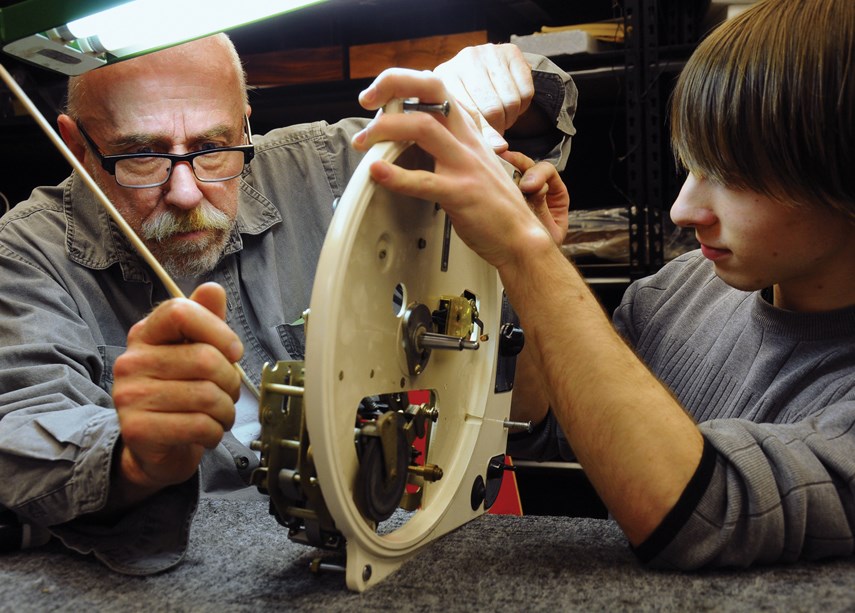No one plays a record by accident.
As scores of eager vinyl enthusiasts flip through neatly organized stacks of records in search of their next sonic gem, the owner of a small storefront in Lower Lonsdale drives home his point that vinyl is special because the experience comes from utmost intentionality.
“So you’ve decided to put on a record? Well, follow the process,” muses Nicholas Seiflow, owner of The Turntable Shop. “You better walk over and find the record. You’re using your eyes. … If it’s an old record, as you open it up you may smell it – old things do have a smell. You’re going to have to walk to the record player, put it on, clean it, drop the stylus into the groove, run back to the chair, and start listening.”
It’s a sensory experience, he explains, a possible antidote to the largely passive and random experience that comes from streaming digital music, and, he adds, vinyl’s tactile nature “may be said to enhance now what you hear.”
But he’s not totally sure about that. Seiflow dismisses the term “audiophile” – used to describe a person who’s particularly obsessed by the quality of high-fidelity audio – and “utterly 100 per cent” rejects the notion that vinyl is without question the superior sonic format for listening to music.
“It’s got nothing to do with the way it sounds, it has everything to do with the way it feels,” he says. “I reject the word ‘audiophile.’ I don’t love audio. I love music.”
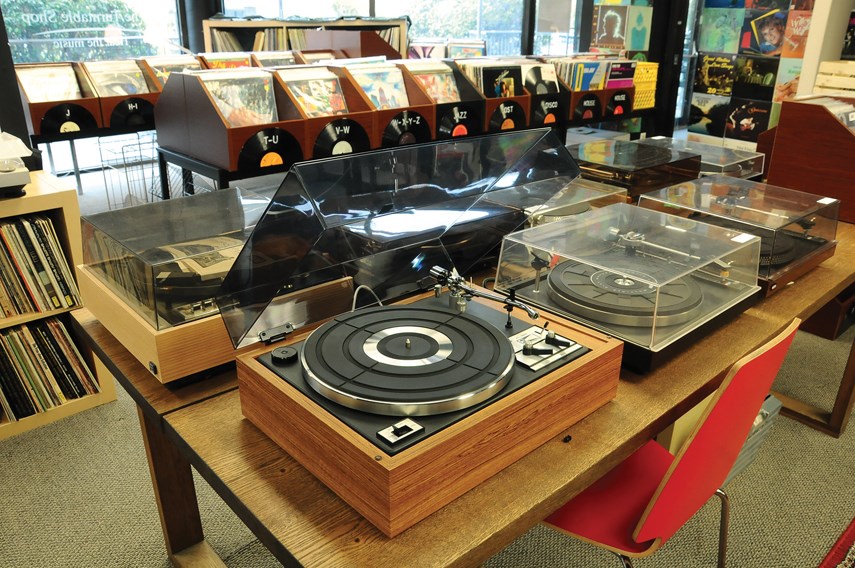
Customers at Seiflow’s shop love music too, but they’re not just there to browse the store’s collection of up to 4,000 used records. The Turntable Shop is a veritable Holy Land for kneeling at the altar of the humble record player.
Seiflow and his small staff, including technician Connor Ramsbottom, specialize in designing, building, repairing, refurbishing, and restoring turntables of all stripes to their former glory.
Upon entering the shop one is greeted with row after row of record players from different eras, from funky experimental numbers – a record player inextricably molded onto the body of a guitar lies in wait up front – to Japanese rarities from the 1980s, as well as other more retro looking designs.
Seiflow sits behind a small desk outfitted with a bright light, mounted magnifying glass, and an army of small tools and gadgets that showcase his attention to detail. Some of his trinkets betray parts of his past life, when he was the owner of a photographic studio, and then an optics business, as well as his penchant for antique telescopes and microscopes.
He gestures behind where he’s sitting to show off some of the latest rigs he’s been working on.
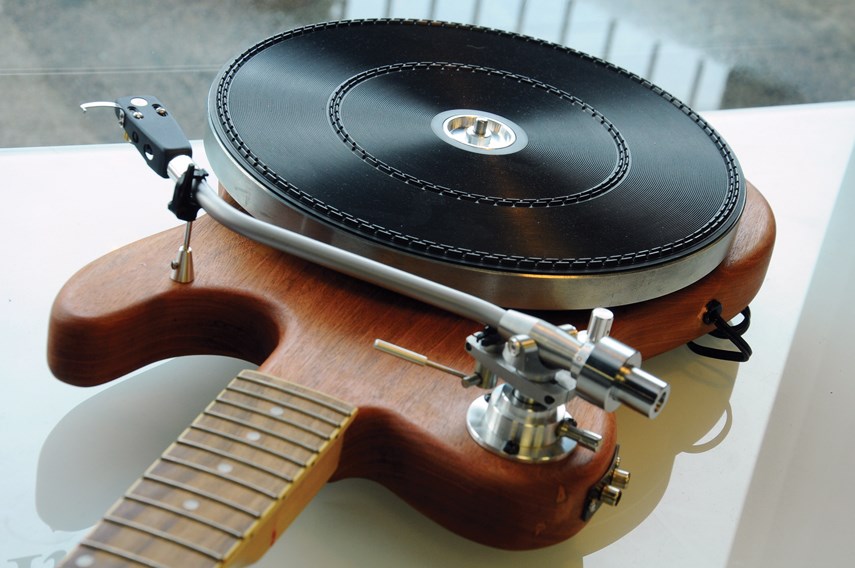
“I’ve got one from Australia behind me, I have one from France to the side of me. We get repairs from the states all the time, because apparently I’m the only person in the world that does this, which of course is not true,” he says with a laugh.
The Turntable Shop is nestled next to a used book store on the ground level of a residential tower on Third Street. It might appear to passersby as a vestige of some bygone era, but Seiflow breaks some astonishing news when asked how long he’s been in business: “It may surprise you – only about three years,” he says, before warmly admitting: “I had no idea whether it would succeed or not, but I suppose it has.”
He’d be right about that.
• • •
Neil Young once notably crooned: “It’s better to burn out than fade away.”
A generation of mythology-obsessed rock stars might have understood what Neil was getting at – that going out in a flaming ball of glory was preferable to letting the cruelty of Father Time run its course – but the mantra certainly hasn’t applied to the steady re-ascendance of vinyl records, a format that shows no signs of either burning out or fading away, and in fact appears to be burning brighter than ever before.
In Canada, the sale of vinyl last year experienced its seventh straight year of growth, according to an annual year-end Nielsen study that looks at the state of the music industry. Sales of vinyl records were up nearly 22 per cent in 2017 over the year before, which marks the single highest sale of vinyl in a year since Nielsen started tracking music sales in the early 1990s.
On April 21, thousands of vinyl lovers across Canada are expected to line up out the doors of their favourite independent record stores in order to score unique releases that are only available on that day. It’s part of an annual event called Record Store Day that’s now in its 11th year.
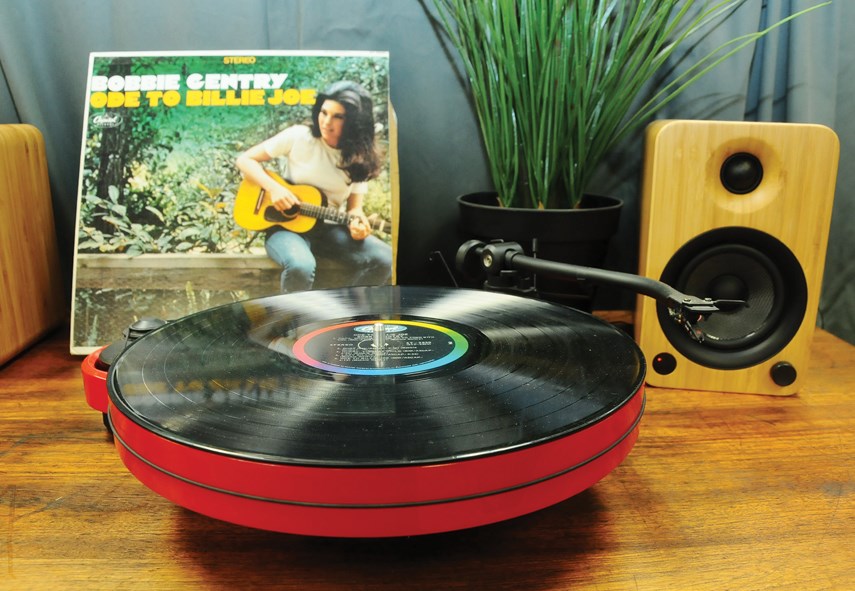
“Record Store Day was designed to get foot traffic in those stores, in those mom and pop stores, to help them generate business, as well as giving back to their communities that they’ve been in for god knows how many years,” explains Ryan Kerr, organizer and director of marketing for Record Store Day Canada.
Kerr notes that Record Store Day started in the U.S. but is now an international event, with vinyl collectors across the world scouring their favourite analog music shops in places like Mexico, Israel, and Australia in search of their next big find.
Asked why vinyl has had such a resurgence over the past decade during a period when buying music online has reached an apex, Kerr blames this one – in a positive way – on Millennials.
“It’s the Millennials that have pushed it,” he says. “It really started there, and then the older generation, the parents, starting saying, ‘Well, you know what, if you’re really into this I’ll either get the turntable refurbished and repaired or why don’t we just go buy one. It’s one or the other.’”
Record Store Day is geared towards merchants that specialize in selling new vinyl, leaving a place like The Turntable Shop, which sells used LPs, unable to officially participate.
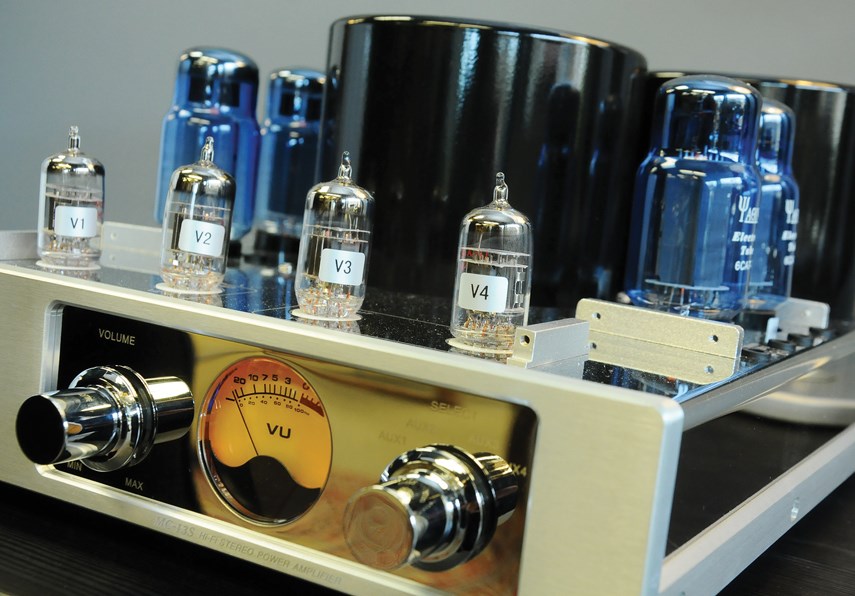
But for Seiflow, this isn’t a problem.
“We’re here to support the industry, which we do passionately of course, but we’re not a record store. We’re a turntable shop that happens to have a bunch of records for sale,” he says. Seiflow motions to a 60-year-old turntable that he has been tinkering away at, trying to breathe new life into. “It will be good probably for another 60,” he says.
Twenty-year-old Connor Ramsbottom might initially look out of place in a shop that deals with hardware from another era, but he has taken The Turntable Shop’s mission to heart. As a technician at the shop, he’s responsible for repairing and restoring the record players that grace the facility, where he says the hardest part is often figuring out what’s wrong with the rig in the first place.
“Is it an automatic mechanism not working? Is sound not coming out properly? Stuff like that,” he says. “You’ve got a very complex piece of machinery that’s multilevel.”
Despite its complexities, Ramsbottom says it’s worth it when a look of nostalgic elation crosses the face of a client after their turntable is returned fixed and restored, after having likely been in the family for generations.
“They drop it off as an heirloom, but looking nothing like the thing that they remembered, and then they come back and it’s all shiny, beautiful, and working flawlessly,” he says. “That’s just a fantastic thing to experience.”
